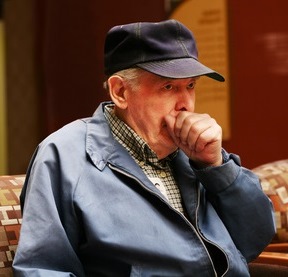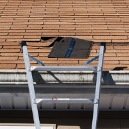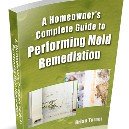Find a pre-screened local mold removal specialist Free Estimate
Find a Mold Specialist Now
Click or Call, Toll-Free 24/7
Coughing Due to Mold Exposure
Experts say that a persistent cough is one of the most common reasons why people visit their doctor. While occasional coughing is considered normal, one that is due to mold exposure in the home is not. A cough is considered “acute” if it lasts three weeks or less. It is considered “chronic” if it lasts longer.
A cough is a common symptom of mold exposure, along with sneezing, a runny or a stuffy nose, a sore throat, shortness of breath, wheezing and headaches. Not everyone exposed to mold develops a cough, but many people that are considered to be mold-sensitive do, especially with prolonged exposure. Infants and young children, because their immune systems are not yet fully developed, elderly people, because their immune systems have weakened with age, pregnant women, and those individuals with respiratory disorders or disorders of the immune system (COPD and AIDS sufferers are examples), are at an increased risk for mold-related illness. However, anyone can be affected. In fact, even family pets can get sick if they are exposed to mold in the home.
Why Does Exposure to Mold Cause Coughing?

Coughing is one of your body’s defense mechanisms. It helps you get “stuff” out that doesn’t belong in your body. This could include dust, food, and especially mold spores. Even a small colony of mold in your home can produce thousands and thousands of mold spores, which are very small, and very light. The average mold spore is 10 to 30 microns in size. To put that into prospective, more than 250,000 mold spores can fit on the head of a pin. The average person can inhale as many as 750,000 mold spores per minute when breathing at a normal rate. Because of their small size, mold spores can easily be dislodged and become airborne. Once airborne they can easily be inhaled.
Inhaling mold spores can irritate the sensitive lining of the throat and nasal passages, causing a cough. Exposure to mold frequently causes other illnesses too, like bronchitis and pneumonia, which also cause coughing.
Is Your Coughing Due to Mold Exposure?
Of course, a cough can be caused by many things other than exposure to mold, including a cold or other respiratory virus, influenza (the flu), seasonal allergies, bronchitis and pneumonia. Some of those illnesses can actually be caused by exposure to mold, such as bronchitis and pneumonia, though of course mold is not the only cause of those conditions. If you think you’ve been exposed to mold, then it is possible that exposure to the mold’s spores is what is causing you to cough. The only way to know for sure is to see your doctor for a diagnosis.
Make sure to let your doctor know if you’ve been exposed to household mold or you suspect that mold may be causing your cough. Your doctor may order tests, such as blood tests, chest x-rays or laboratory tests of any mucus, to help make an accurate diagnosis.
Treating a Cough Caused by Mold Exposure
Your doctor will recommend treatment based on the cause of your cough. Treatment may include antibiotics for an infection, antihistamines to dry up excessive mucous and a cough suppressant if coughing is keeping you awake at night, although in some instances doctors feel it’s preferable for you to continue to cough up mucous or other secretions that are in your lungs or airways. You can use cough drops to help soothe your throat and relieve your cough.
In order for any treatment for mold exposure to be effective, you will also need to eliminate any continued exposure to mold. This may mean a temporary, or even permanent, relocation from your home if that is where the exposure is taking place. If you continue to be exposed to mold, you will undoubtedly continue to suffer symptoms and your condition may even worsen.
Avoiding Future Exposure to Mold
It’s important to thoroughly remove all molds from your home and then take steps to prevent mold from returning. You need to do this in order to prevent future mold-related illness. You will need to figure out what caused mold to start growing in your home to begin with, and then to correct the problem in order to prevent mold from returning. That means:
- Identifying and stopping the source of any moisture
- Removing any contaminated materials, and
- Cleaning all the areas in the home that have been affected by mold
What to do if Coughing is Caused by Mold Exposure
First consult your family doctor. Your health, and that of other family members in the home should be of utmost concern.
Next, we recommend scheduling a free in-home consultation with a mold remediation professional. They will inspect your home and advise you about the mold removal process. They will also tell you how to prevent the mold from returning. If you’re experiencing a cough or other health problems related to exposure to mold, it’s probably best for you to have a professional handle the mold removal for you. Be sure to ask your doctor if removing mold from your home yourself could make your condition worse. Even if you plan to handle the mold removal yourself, you can benefit from some free expert advice. Follow this link to get a list of experienced mold removal professionals offering free in-home consultations near you.
Return From Coughing To Our Main Symptoms Page
Free Home Inspection By A Mold Removal Specialist
Search This Website
Recent Articles
-
See Our 5 Recommended Mold Removal Companies in Covington, KY
Apr 16, 25 12:59 PM
-
See Our 5 Recommended Mold Removal Companies in Wheaton, IL
Jun 20, 24 10:33 AM
-
See Our 5 Recommended Mold Removal Companies in Aberdeen, SD
Oct 08, 21 04:05 PM




